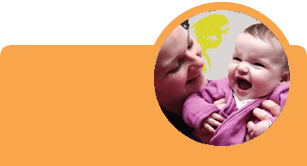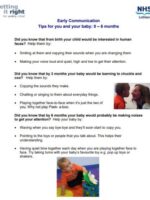
Tips for you and your baby: 0 – 6 months
Did you know that from birth your child will be interested in human faces? Help them by:
- Smiling at them and copying their sounds e.g. when you are changing them.
- Making your voice loud and quiet, high and low to get their attention.
Did you know that by 3 months your baby will be learning to chuckle and coo? Help them by:
- Copying the sounds they make.
- Chatting or singing to them about everyday things.
- Playing together face-to-face when it’s just the two of you. Why not play Peek- a-boo!
Did you know that by 6 months your baby will probably be making noises to get your attention? Help your baby by:
- Waving when you say bye-bye and they’ll soon start to copy you.
- Pointing to the toys or people that you talk about. This helps their understanding.
- Having quiet time together each day when you are playing together face to face. Try taking turns with your baby’s favourite toy e.g. pop up toys or shakers.
Tips for you and your baby: 9 – 18 months
Did you know that by 9 months, your baby will be starting to understand the words you use in your daily routine? Help your baby by:
- Keeping the words you use in your daily routine consistent e.g. “time for lunch”, “bath time” and “time for bed”.
- Singing songs with actions.
- Listening to the sounds they say and chatting back.
- Following what they want to do in play e.g. if it’s bricks, your baby might want to knock the bricks together instead of making a tower.
Did you know that by 12 months your child will be trying to tell you things by pointing, babbling and making faces? Help your child by:
- Naming the things they point to.
- Speaking in short sentences e.g. “mummy’s coat”.
- Talking to them about what they see.
- Singing songs and nursery rhymes.
Did you know that by 18 months your child may have some first words? Help them by:
- Making animal noises when you see animals e.g. “moo”, “baa”.
- Having pretend playtime e.g. having a picnic with teddy or talking on the telephone.
- Talking to them about what you’re doing e.g. when putting the shopping away or when making dinner.
- Copying what they say, and adding an extra word e.g. child says: “bus” you say: “yes, a big bus”.
Remember children develop at different rates. If you have any queries regarding your child’s development, please speak to your Health Visitor, or contact your local Speech and Language Therapy department.





